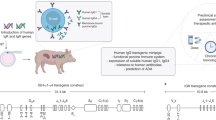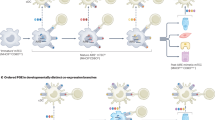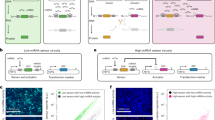Abstract
THE migration of cells from capillary tubes in tissue culture chambers has proved valuable in studies on delayed hypersensitivity in guinea-pigs1,2. Using this technique, it was observed that inhibition of migration of peritoneal cells from guinea-pigs with delayed hypersensitivity to tuberculin and other protein antigens occurs only in the presence of the specific antigen. On the other hand, peritoneal cells from guinea-pigs producing circulating antibody were not inhibited by the corresponding antigens.
This is a preview of subscription content, access via your institution
Access options
Subscribe to this journal
Receive 51 print issues and online access
$199.00 per year
only $3.90 per issue
Buy this article
- Purchase on SpringerLink
- Instant access to the full article PDF.
USD 39.95
Prices may be subject to local taxes which are calculated during checkout
Similar content being viewed by others
References
George, M., and Vaughan, J. M., Proc. Soc. Exp. Biol. and Med., 111, 514 (1962).
David, J. R., Al-Askari, S., Lawrence, H. S., and Thomas, L., J. Immunol., 93, 264 (1964).
Rosenau, W., and Moon, H. S., J. Nat. Cancer Inst., 27, 471 (1961).
Author information
Authors and Affiliations
Rights and permissions
About this article
Cite this article
AL-ASKARI, S., DAVID, J., LAWRENCE, H. et al. In vitro Studies on Homograft Sensitivity. Nature 205, 916–917 (1965). https://doi.org/10.1038/205916a0
Issue date:
DOI: https://doi.org/10.1038/205916a0
This article is cited by
-
Crystal structure of the macrophage migration inhibitory factor from rat liver
Nature Structural Biology (1996)
-
Correlation between cytotoxic lymphocytes and cells synthesizing macrophage migration inhibition factor in the H-2 system
Bulletin of Experimental Biology and Medicine (1975)
-
Effect of Multiparity on Human Maternal Hypersensitivity to Foetal Antigen
Nature (1973)
-
In vitro Detection of Enhancing Antibody by the Macrophage Migration Test
Nature New Biology (1971)
-
In vitro Reactivity of Lymphocytes to Particulate and Soluble Antigens
Nature (1970)



